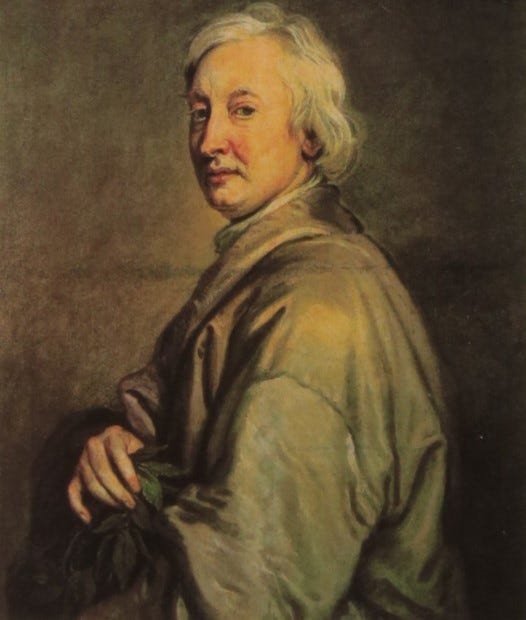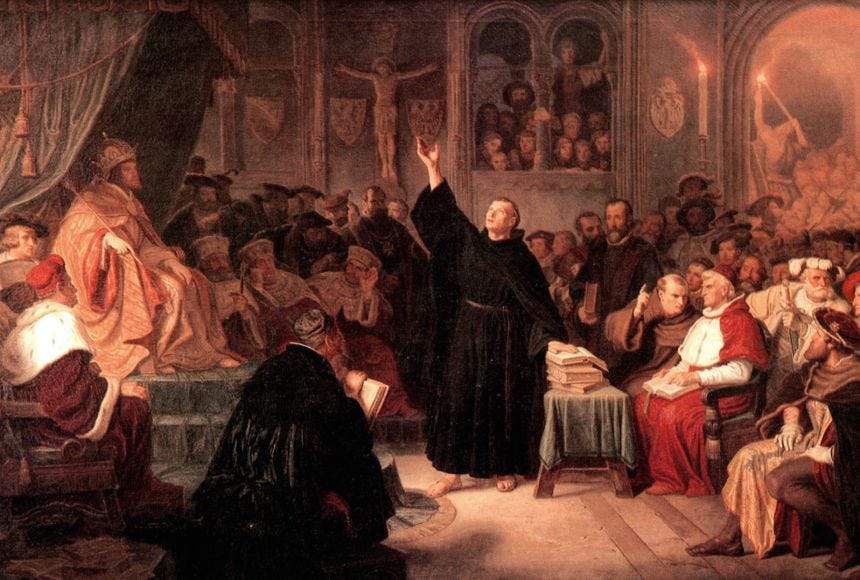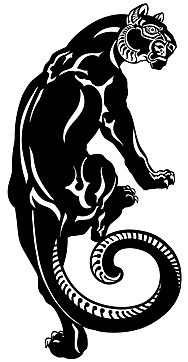John Dryden (1631-1700) numbers among the forgotten greats. The first poet laureate in English history, a staunch monarchist, and the one who most famously eulogized the Return of the King.
His era began with Cromwell and ended with the aftermath of the Glorious Revolution. His was the time when England had a Catholic king in James II, who eased the suppression aimed at Catholicism and lifted many Catholic loyalists into positions of influence. In a shock and awe moment Dryden, the poet laureate of protestant England, converted to Catholicism!
As may be guessed, his position collapsed after installation of William of Orange. He was stripped of his laureateship and central position in cultural life. But despite all the hardship and opposition, Dryden never recanted from the faith that had wrecked his reputation.
Despite the changing political tides, his greatness as a poet could not be denied, as it appears Dryden was allowed to keep on living in London, though the law said Catholics were to be barred from the capital. Although largely sidelined, Dryden continued to have an influence on English culture – not only in his elder years, but throughout the following centuries.
A man’s poet
Every reader and critic seems to agree on at least one point: Dryden is a masculine poet. His style is always vigorous, confident, unflinching.
“He always expresses with cleanness what he thinks with vigor.” Says Samuel Johnson.
With Dryden you get “manly directness, fullness of breath.” Says T. S. Eliot
“His passion was the passion of assurance. He loved speaking fully and with finality. With honest words, even if not with an honest heart.” Says Van Doren.
A big part of Dryden’s masculine style results from his chosen meter, the heroic couplet, which it can be said he perfected. At the time, blank verse had been gaining ground through the success of Milton and others. Dryden opposed such development, and saw the value of rhyme, and of the simple directness of the rhyming couplets. No nonsense. No trickery. No freewheeling. No redefinition. No rebellion. No subversion. It’s a traditional poet’s poetry.
“None but the brave deserves the fair.”
Another reason is the classical influence. Dryden’s English is built on top of his Latin, both in terms of style and in terms of literary influences. Virgil is by far his greatest mentor, but other ancients like Ovid and Lucretius also have an influence. The Roman poets had a sense of elegant clarity which is echoed in Dryden’s words. Dryden also made great efforts translating the ancient Roman poets, particularly notable are his translations of the complete works of Virgil. Here too we notice Dryden’s confidence. His aim is not to replicate Virgil, but basically to write English in the way he imagines Virgil would have written it had he been a contemporary.
Third reason are the topics he chooses. Here he is not only the most manly of all English poets, but also the most uneven. Certain topics fit him perfectly, others horribly. He is at his best when he gets to assert his opinions and to write as if he’s speaking from the pulpit. In fact that’s how he always writes, but the pulpit fits certain topics better than others.
Dryden is considered to be at his worst when describing powerful emotions in a way that is supposed to feel tender and genuine. Dryden’s strength has a coldness to it, which doesn’t fit well with tenderness. His love scenes in particular tend to feel stilted and affected. Van Doren points out that Shakespeare is often thought to be at his best when describing relationships between male friends, and this is even more true with Dryden. In the moments when he has to depict emotions, he’s at his best with the manly ones.
“He to God’s image, she to his was made.”
Partly it has to do with the register he sets for his language. It hits a pleasing middle-ground, stripping poetry from arcane learnedness and empty fancifulness that had characterized the metaphysical poets who had preceded him. Dryden considered even Shakespeare a bit too archaic and obsolete, and the reader will find that Dryden is much easier to read than Shakespeare, though both were poets of the 17th century.
At the same time, Dryden had no taste for vulgarity, not in Shakespeare nor anywhere else. His poetry remains elevated, noble, dignified, even when it is composed to make fun and to ridicule. The setting up of the proper register for English poetry was Dryden’s key achievement, according to Doctor Johnson.
“He refined the English language, improved sentiments, and tuned the numbers of poetry. His style has a beauty totally free of disproportionate parts. It is impossible to ridicule by exaggeration. He taught us to think naturally and express forcibly.
He found English poetry in brick, left it in marble.”
According to Eliot, Dryden is at his very best when he gets to lift up his topic. His power is in making the small great, the trivial into something grand. For all his intellect and learning, Dryden had a ‘common place mind’ that flowed in a common sense direction. This pushes him in directions less arcane and more straightforward, more approachable. But it may be argued this also makes him less sublime and less capable of true profundity.
This is because for Dryden sublimity was not part of the genuine content of the poetry, but was more of a trick or a technique. Van Doren calls it simple ‘amplification’, which makes many of Dryden’s poems look like they are dwarfs in giant’s clothing. But the lack of profundity may also be a result of Dryden’s clear style, which results in a lack suggestiveness, or ‘resonance’.
“When empire first from families did spring, then every father governed as a king.”
On the other hand, suggestiveness tends to have a non-committed and distinctly effeminate air. There is no room for that in Dryden. With him we gain a satisfying completeness of statement, a fullness of breath. He is a man who says things as they are, and one who always uses the same style. He’s like a railway engine that smashes through brick walls if necessary. As Van Doren puts it, Dryden had ‘adamantine confidence’ in his skill and way of doing things, even in occasions where such confidence was less warranted. However, the sheer unapologetic assurance gives Dryden a peculiar charm, even when the execution ends up lacking.
Eliot also notes that the critics who have been most vocally critical of Dryden’s lack of profundity were all Victorians – notorious for the same deficiency! After all, the Victorians were typically putting the emphasis on moods and atmospheres, while remaining distinctly weak on the profound. Eliot argues that the dislike Victorians had for Dryden is understandable, as in many ways he is their antithesis. As such, if you find yourself weary with or disinclined to Victorian poetry, giving Dryden a try may be a good idea. Nevertheless, Eliot reminds us that some of the key poets best loved in the Victorian era were greatly indebted to Dryden (for example, Byron and Wordsworth).
“O God, said he, thou patron of my days,
Guide of my youth in exile and distress!
Who me unfriended brought’st by wond’rous ways
The kingdom of my fathers to possess.”
(The prayer of King Charles II from Annus Mirabilis, which brings to mind the Oath of Elendil, sung by Aragorn in his coronation.)
The Hind and the Panther
A favorite of mine among Dryden’s poems is his theological allegory and analysis of the relationship between the Anglican and the Catholic churches (and many other churches on the side). Here Dryden gets to state, to argue, to preach freely. The topic fits him very well, and the Biblical framework it offers him is likewise a good match. This poem perhaps best exemplifies Dryden’s work as the mingling of the political and the aesthetic.
While not his most beautiful poem in terms of pure aesthetics, it is certainly among the most intellectually stimulating, and calls to question the criticism that Dryden couldn’t be profound. Perhaps not profound in emotion, but poems like this show that he could certainly be profound when treating an issue.
This is a poem Dryden wrote after his conversion to the Catholic Church, and may be taken as an intellectual justification or explanation for the momentous decision. It includes many of the traditional pro-Catholic arguments in powerful poetic form. Everything is presented as an animal fable, where the Hind represents the Catholic Church, and the Panther the Anglican. Different and opposite, yet connected by their spots. In the following I will highlight certain evocative verses.
“Doomed to death, fated not to die”
Dryden begins the poem by describing the hardships the Catholic church has undergone, from the Roman persecutions in ancient time to the Anglican ones in the modern. He then goes on to describe the different offspring of the Church, meaning all the various protestant sects. Later he moves on to more fundamental issues.
“Can I believe eternal God could lie
Disguised in mortal mould and infancy?
That great maker of the world could die?
And after that trust my imperfect sense,
Which calls in question his omnipotence?
Can I my reason to my faith compel,
And shall my sight, and touch, and taste rebel?
Superior faculties are set aside,
Shall their subservient organs be my guide?
Can they who say the host should be descried
By sense, define a body glorified?”
Why let your faith rebel at transubstantiation when you already believe in the Incarnation? The latter is at least as astonishing as the mystery of the Eucharist, and fundamentally its repetition. Why is my faith strong on one account, but weak on the other? If I believe the latter is theologically reasonable, why isn’t the former?
“God’s and kings’ rebels have the same good cause,
To trample down divine and human laws:
Both would be called reformers, and their hate
Alike destructive both to church and state;
The fruit proclaims the plant: a lawless prince
By luxury reformed incontinence;
By ruins, charity; by riots, abstinence.
Confessions, fasts and penance set aside,
O with what ease we follow such a guide!”
A religious revolution, just like a political revolution, pushes us on an easy slope down hill. Dryden argues man is naturally pleased by both kinds of self-serving tumults, and eagerly welcomes a guide offering such a passage.
“Rebellion equals all, and those who toil
In common theft will share the common spoil….
As long as words a diff’rent sense will bear
And each may be his own interpreter,
Our airy faith will no foundation find;
The word’s a weathercock for every wind….
The wretched Panther cries aloud for aid
To church and councils, whom she first betrayed;
No help from Fathers or tradition’s train:
Those ancient guides she taught us to disdain.
And by that Scripture which she once abused
To reformation, stands herself accused.
And, after all her winding ways are tried,
If doubts arise she slips herself aside
And leaves the private conscience for the guide.”
Dryden points out the weakness and arbitrariness of the Anglican and wider Protestant position. The high church protestants like the Anglicans or the Lutherans may want to moderate the revolution they themselves instigated, but on what basis may they do so? If tradition is not allowed full authority alongside Scripture, if the Church hierarchy is questioned, and if each believer is to be his own interpreter, how can the Anglican church have a leg to stand on when deciding questions of doctrine? We naturally end up with liberal Christianity, where all we are left with is our private conscience as our guide.
“They [men of the Nicene council] tried the Scripture by tradition’s force;
But you tradition by the Scripture try;
Pursued by sects, from this to that you fly,
Nor dare on one foundation to rely.
The word is then deposed, and, in this view,
You rule the Scripture, not the Scripture you.
I see tradition then is disallowed
When not evinced by Scripture to be true,
And the Scripture as interpreted by you.
Thus when you said tradition must be tried
By sacred writ, whose sense yourselves decide,
You said no more but that yourselves must be
The judges of the Scripture sense, not we.
Against our church tradition you declare,
And yet your clerks would sit in Moses’ chair.’”
Here Dryden homes in on the problem of Sola Scriptura, and the blatant power game ultimately underlying it. The power belongs to him who interprets, and if we do not let ancient, long since passed generations guide our interpretation, the process becomes a live political issue. This is but one way how tradition supports peace and stability.
“Before the Word was written,’ said the Hind,
‘Our Saviour preached his faith to humankind;
From his Apostles the first age received
Eternal truth, and what they taught, believed.
Thus by tradition faith was planted first;
Succeeding flocks succeeding pastors nursed.
This was the way our wise Redeemer chose
(Who sure could all things for the best dispose)
To fence his fold from their encroaching foes.
He could have writ himself, but well foresaw
Th’ event would be like that of Moses’ law:
Some difference would arise, some doubts remain,
Like those which yet the jarring Jews maintain.
No written laws can be so plain, so pure,
But wit may gloss and malice may obscure.
Thus faith was ere the written word appeared,
And men believed not what they read, but heard.”
Dryden gives his full support to the primacy of tradition, which is most obviously true in the chronological sense, as clearly the Apostolic Tradition existed decades before anything was written down, and for centuries before the Bible was canonized (by the Church, and based on the authority of Apostolic Tradition). If Scripture was to be ultimate and primary, surely Jesus would have written a book? But instead he established a church, and formed personal relationships with particular men, to whom he gave his blessing and his teaching authority, installing them as the leaders of his church.
Dryden ends by giving his definition of the Church, based on the Nicene Creed:
“One in herself, not rent by schism, but sound,
Entire, one solid shining diamond,
Not sparkles shattered into sects like you,
One is the church and must be to be true:
One central principle of unity.
As undivided, so from errors free,
As one in faith, so one in sanctity.
Thus she and none but she th’ insulting rage
Of heretics opposed from age to age.”
All in all, the poem is an excellent illustration of Dryden’s qualities. His devoutness, his Catholic counter cultural position, his manly confidence, his assertiveness, the style fit for the pulpits, at its best when the poet gets to argue with his full voice. It also illustrates the way how Dryden defined poetry’s purpose: instruct by pleasing.
In The Hind and the Panther the aim is highly didactic and politically charged, but everything is done with a degree of grace and beauty that should please even his opponents. Even while treating a divisive topic where emotions run high, Dryden was always careful with proper taste and decorum. According to him, a poet must always be wary of “thoughts improper for subject, expressions unworthy of thought.” Indeed, success in faithfully following this rule goes a long way in explaining the lasting greatness of Dryden.






